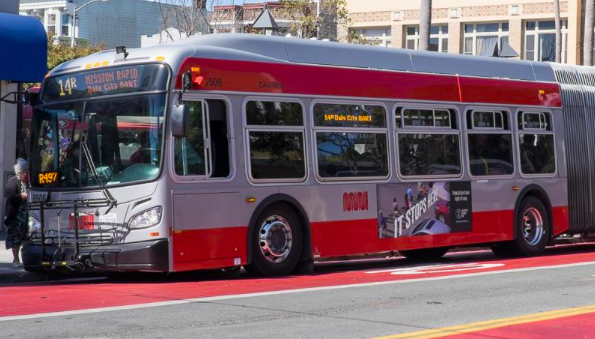San Francisco moved a step closer Tuesday to a policy that’s been a dream of transit justice advocates for decades: Free Muni.
It wasn’t easy.
And now the mayor wants to block it.
Sup. Dean Preston has proposed a pilot project that would fund free Muni for all San Franciscans between July and September. It’s not that expensive (by city-budget standards): The cost would run about $13 million.

That’s in part because Muni is running way below capacity right now, and as the pandemic eases, everyone expects that ridership will return only slowly.
But Preston said that’s part of the point: Anything the city can do to get people back on Muni right now is going to be positive.
The measure passed, 7-4, after some remarkable discussion. Among the issues: the SFMTA board might just decide to defy the supes and not spend the money, just as Mayor London Breed refused to spend money on hotel rooms for the homeless.
So Breed, who controls the SFMTA Board, could make sure this never happens. Which is what she plans to do.
Help us save local journalism!
Every tax-deductible donation helps us grow to cover the issues that mean the most to our community. Become a 48 Hills Hero and support the only daily progressive news source in the Bay Area.
But there was much more to the debate, including a rather stunning discussion about whether a $3 fare discourages some people from riding the bus.
Sup. Catherine Stefani, who represents a district with few low-income people and a lot of rich people, actually said that “fares are not a big reason that people avoid transit.”
There’s a lot of academic research on this. It’s really complicated stuff with detailed mathematical models looking at what economists call the “price elasticity of demand” – that is, how many people will stop using a service when the price goes up.
There’s no agreement among economists (go figure!) about the actual elasticity numbers, but pretty much everyone agrees that there is such a thing – that when you raise fares, some people stop riding. (We used to use a rule that said every three percent fare hike leads to a one percent drop in ridership, but that’s changing, and transit situations are different all over the world, so it’s hard to pin down.)
And while the $3 may not be an issue for a lot of Marina and Pacific Heights residents, Sup. Shamann Walton said that Stefani’s argument was out of touch with the reality of many SF residents.
“This a big deal for people with no means,” he said. “Money for Muni fare means a lot if you are making minimum wage.”
Sup. Hillary Ronen pointed out that the ridership of many of the bus lines in her districts (the Mission and Portola) is overwhelmingly people of color, who are overwhelmingly targeted by fare inspectors, who cite and fine them, burdening them with fees they can’t pay and dragging them into the criminal justice system.
So this isn’t just a transit issue – it’s an equity issue.
Sup. Rafael Mandelman opposed the pilot project, saying that “this is not a good way to spend money.” He talked about all of the longstanding issues facing Muni, including the lack of service, buses that don’t stop for passengers, and the fact that the city needs a long-term plan to fund Muni at a level that everyone agrees we need.
The money, he said, could be used for other things, like supportive housing and more Muni drivers. “We really need to talk about the tradeoffs in the budget,” he said.
Walton: “We spend money in this city on a lot of things. We spend millions of dollars on incarcerating people.”
Sup. Myrna Melgar said that the MTA “doesn’t have the staff to bring the system back to pre-pandemic levels.” Some key light-rail routes on the West Side of town are still not running, she said, and free Muni means nothing if there’s no train to ride.
Walton said that Muni should be able to restore service – and use the supplemental money (which would be in addition to the current Muni budget) to see if a three-month experiment with no fares would work.
“I can’t accept that the SFMTA says we can’t do it,” he said. “We need to stop making excuses for people who make hundreds of thousands of dollars a year.”
The four supes who voted No were Mandelman, Stefani, Melgar, and Ahsha Safai.
This isn’t, Preston noted, a long-term plan for free Muni. It’s just a short-term trial. And the mayor may veto it. But for people who have called for transit justice for decades, it’s a big step.




